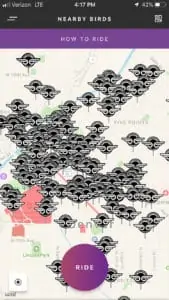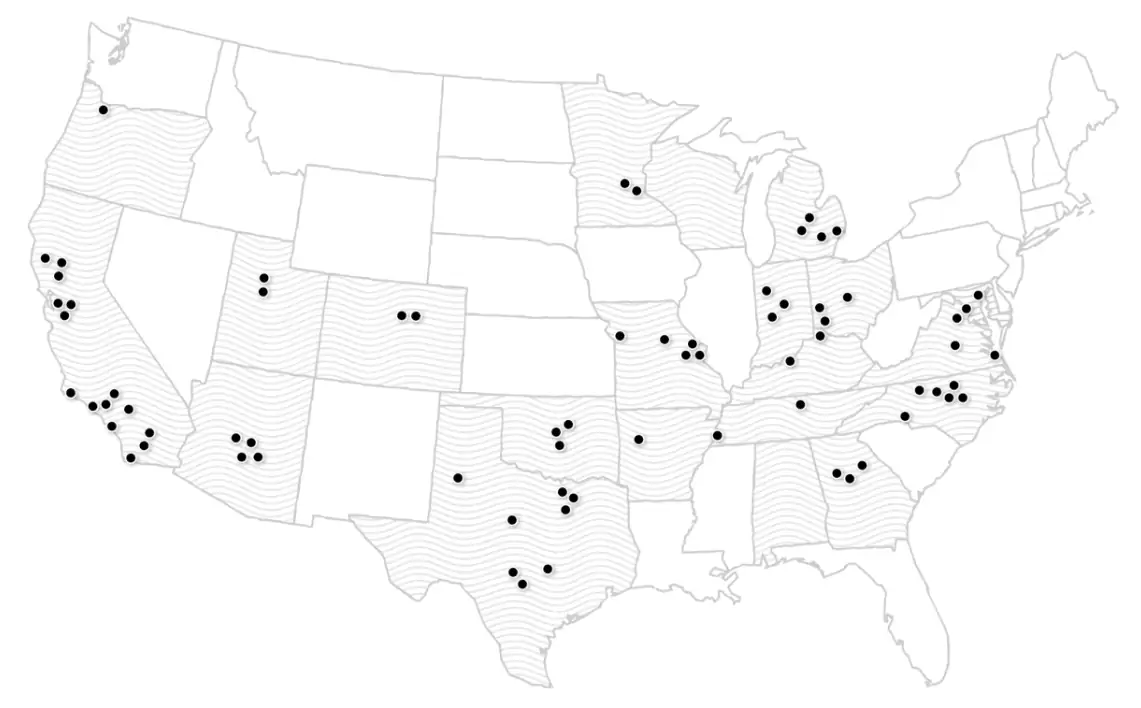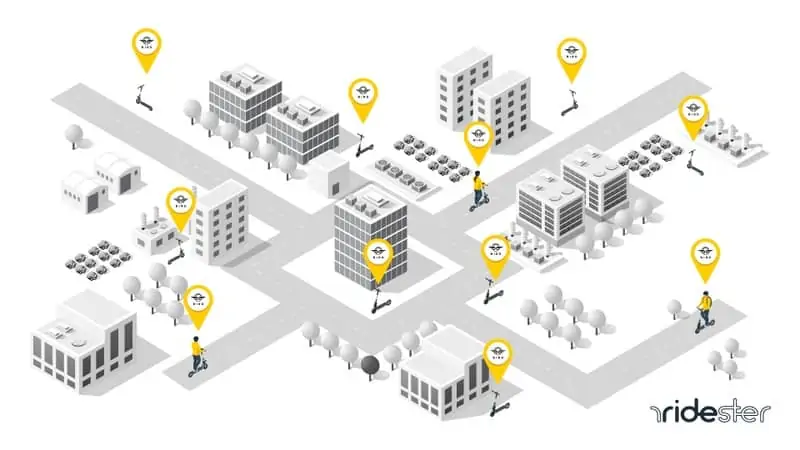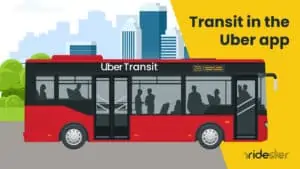Bird Scooter Global Reach
Bird was founded in 2017 by Travis VanderZanden, who was a former executive at Uber and Lyft. In the years that followed, the company went through many highs and lows until it was finally able to announce its intention to go public in May 2021.
Several months later, the special purpose acquisition company (SPAC) closed the deal and Bird was now merged with the acquisition company Switchback II. Going by its new name, Bird Global, Inc., the company started trading on the New York Stock Exchange.
Based in Miami, Florida, Bird currently operates in more than 400 cities in 17 countries around the world including the US, Canada, Europe, Australia, and the Middle East.
In What Cities Are Bird Scooter’s Available?
As mentioned above, Bird Global is now available in numerous cities around the world. And with such promising financial prospects, it doesn’t look like they’re stopping any time soon.
They’ve recently expanded their operations across the Greater Toronto Area (GTA). With this move, Bird has become the exclusive e-scooter operator in the city of Hamilton and operates through third-party vendors in Brampton and Oshawa.
It now also operates in cities like NYC, San Francisco, South Miami, and Springfield, Missouri.
In addition, while Bird has already been operating in Australia since 2019, it also just expanded operations into the MidCoast region and Willoughby as part of the eight new markets recently launched by the company.
Because the list is so exhaustive, we recommend that you check the Bird map for more information on whether there are scooters available in your area and where to find them.
How to Find Bird Scooter Locations Through the App
The easiest way to tell if Bird Scooters are available in your area is to check their smartphone app (iOS and Android).
Once downloaded, here’s how to use the app to locate Bird scooters in your city:
- Open up the map to see all available vehicles.
- To learn more about a particular vehicle, tap the icon next to it and a banner will appear with additional information including when the vehicle was last used and the last time it sent out its location data.
- Prompt your phone to open your choice of navigation app and provide you with directions on how to reach the vehicle from your current location, tap the paper airplane icon on the left-hand side of the screen.
- If you arrive at a location but can’t find the vehicle, enable the Bluetooth function on your phone and tap the Alarm button to get the vehicle to make a sound.
- If you still can’t locate the vehicle or hear the alarm, tap Mark Missing to inform other users that this location is no longer accurate.
- To start your ride, tap Capture to scan the QR code on the scooter with the app. You can also manually enter the ID of the vehicle, which you’ll find listed below the QR code.
As you will see, the Bird app will access your location and show you if there are any nearby scooters.

If Bird Scooters are available, their locations will appear on a map. It will look like Uber or Lyft. But instead of nearby cars, you will see scooter icons.
If Bird Scooters are not available in your city, a popup message will appear stating that Bird is not yet available in your location.
If you are a city official and would like to get the scooters in your city, you can reach out to the Bird team via email: city@bird.co.
Bird regularly updates their website with a list of cities where Bird scooters are legal.
In most cases, the scooters are in a condensed downtown area. If you look at the maps on the mobile app, there will be areas in red where the scooters are prohibited.

Last we checked, the following cities allow the dockless scooters in some capacity according to Bird:
Alabama
- Auburn
- Birmingham
Arizona
- Mesa
- Scottsdale
- Tempe
California
- Alameda
- Campbell
- Culver City
- El Cajon
- La Mesa
- Long Beach
- Los Angeles
- Oakland
- Piedmont
- Riverside
- San Diego
- San Jose
- San Luis Obispo
- Santa Clara
- Santa Cruz
- Santa Monica
- West Hollywood
Colorado
- Aurora
- Denver
Florida
- Coral Gables
Georgia
- Athens
- Atlanta
- Decatur
Indiana
- Bloomington
- Indianapolis
- West Lafayette
- Kentucky
- Covington
- Louisville
Maryland
- Baltimore
Michigan
- Ann Arbor
- East Lansing
- Detroit
- Windsor
Minnesota
- Minneapolis-St. Paul
Missouri
- Columbia
- Kansas City
- Richmond Heights
- St. Louis
- University City
North Carolina
- Charlotte
- Greensboro
- Raleigh
- Winston-Salem
Ohio
- Cincinnati
- Columbus
- Grand View Heights
- Upper Arlington
Oklahoma
- Norman
- Oklahoma City
- Stillwater
Oregon
- Portland
Tennessee
- Memphis
- Nashville
Texas
- Abilene
- Austin
- Dallas
- Highland Park
- Lubbock
- Shavano Park
- San Antonio
- University Park
Utah
- Salt Lake City
- South Salt Lake
Virginia
- Arlington
- Norfolk
- Virginia Beach
- Richmond
Washington, D.C.
- Washington, D.C.
Besides these U.S. cities, Bird Scooters partners with select university campuses. This is an excellent solution for college students looking for a faster way to navigate around large campuses.
These college campuses currently allow Bird Scooters:
- Abilene Christian University
- Concordia University
- Coppin State University
- Howard University
- Johns Hopkins University
- Loyola University
- Morgan State University
- Ohio State University
- Point Loma Nazarene University
- Queens University
- San Diego State University
- Shaw University
- UCLA
- University of Cincinnati
- University of Minnesota
- University of Maryland, Baltimore
- University of Portland
- University of Texas, Austin
- University of Utah
Bird is eager to spread across the country as quickly as possible. They are currently available in 20 states and show no signs of slowing down. They have started to look overseas for more expansion opportunities.
At the time of writing this article, Bird Scooters are available in these international cities:
- Vienna, Austria
- Brussels, Belgium
- Paris, France
- Tel Aviv, Israel
We’ll do our best to keep this list up to date. However, the best way to check if Bird scooters are available in your area is to open the app.
P.S. Looking to make some extra cash? See how to make money in your sleep as a Bird charger.
Understanding Bird’s Service Areas Within Cities
To help facilitate the use of this popular scooter rental service, users have access to a color-coded map of their city.
For example, any yellow on the map refers to slow-speed areas. Grey and red areas are locations where riding and parking may be restricted.
In addition, to ensure the safety of their scooters and, more importantly, their customers, Bird has embedded a handful of useful features into their vehicles.
Take a look.
Outside City Limits
For every location where Bird scooters are found, riders can only use them within the limits of the city. If a scooter is taken outside these limits, the scooter will begin to issue several notifications until it’s safely brought back into the city limits.
If it’s not brought back, the scooter will become too unstable to use. In fact, the farther it strays away from its pre-set limits, the more unstable it’ll become.
On the Sidewalk
Riding a Bird e-scooter on the sidewalk may seem like a great way to save time and get to your destination faster. Yet, it’s dangerous and puts the rider and pedestrians in harm’s way.
To try and prevent this dangerous habit, Bird uses an end-to-end GPS based on technology provided by a company called u-blox. With the help of this sophisticated technology, riders will now be met with pesky audio alerts and smartphone notifications warning them to get off the sidewalk and back into the street.
Failure to do so will result in the scooter becoming unstable, slowing down, and gradually coming to a complete stop.
Bird Scooter Location Updates and Notifications
After downloading the app, you might notice that no Bird Scooter icons pop up on the map. In this case, a popup message will appear telling you that Bird doesn’t operate in your area.
Check out their website for information on when they may be coming to your location as well as where you can currently find them. The website will also list all the areas where Bird scooters are legal and where they’re prohibited.
Community-Driven Locations
Bird Global is keen on expanding its operations. This is evident by the way the company is putting in a lot of effort in working with communities to prioritize safety and develop sustainable solutions all while making riding fun.
They’ve even set up a ‘Community Mode’ feature on the app. By accessing this feature through the yield icon, anyone can submit a complaint to the Bird crew members. This allows users to feel like they’re part of a team and enables the people at Bird to address any issue as soon as possible.
What Cities Do Not Allow Bird Scooters?
Let’s go over some of the areas where the scooters are banned.
In most cases the bans are temporary, and Bird seems to be working with local officials to get the bans lifted.
For example, there are now Bird scooters in NYC after they eventually were able to break into the city.
San Francisco
This city might come as a surprise to some, considering Bird is based in California and has received funding from venture capital firms based in the Bay area.
Towards the end of March of 2018, Bird dropped off hundreds of scooters in San Francisco without receiving approval from the city to do so.
After operating for a few weeks, the city decided to ban all electric scooters until further notice.
The San Francisco Municipal Transportation Agency (SFMTA) reported almost 2,000 complaints about the scooters in April and May 2018.
At the end of August, the SFMTA updated their policies to allow dockless electric scooters.
However, Bird and Lime scooters are still banned in the city.
The city offered two permits to different companies: Scoot and Skip.
The permits allow the two companies to release 625 scooters each for six months, with the potential to increase that number to 2,500 each after that.
Beverly Hills and West Hollywood
In June, the city of West Hollywood voted to ban Lime and Bird scooters from operating within city limits.
The following month, the Beverly Hills city council followed suit and voted to ban the use of all-electric scooters, including Bird Scooters, for six months.
West Hollywood has not set a timeline for when the scooters could be reintroduced.
Cambridge, MA
Earlier this summer, Bird dropped off a bunch of electric scooters in Cambridge and Somerville, Massachusetts.
It didn’t take long for local governments to send out cease and desist letters asking for their removal.
When Bird didn’t act, the city took matters into their own hands. Government employees swept in and started confiscating the scooters.
Without putting up a huge fight, the company came back and removed all scooters from the area.
The company said the decision was completely voluntary.
We have no information on whether the electric scooters will return to the area.
Why Are Bird Scooters Banned?
As you can tell, Bird and other electric scooter companies are struggling to bring the product to market in some areas.
But why don’t cities want them?
We’ve identified 4 main reasons that city officials are hesitant to allow these scooters in their district:
How They Were Introduced
There are several reasons why some cities weren’t interested in Bird Scooters.
The first is the way they were introduced.
Earlier this summer, Bird started dropping off scooters overnight.
It was a complete surprise to residents and city officials.
One day there are no scooters.
And they next day they are everywhere.
This shocked a lot of people, particularly government officials.
Dropping off hundreds of electric scooters overnight can cause a significant disruption to traffic, both on streets and sidewalks.
From our research, most cities are open to electric scooters. However, these cities need time to lay out the rules and regulations.
Most cities want to introduce the scooters slowly and have an educational campaign associated with it.
City officials want to have clear rules on where people can operate and park the scooters to ensure that these personal transportation devices are used safely and don’t interfere with traffic.
Lastly, most cities want a piece of the pie.
Like early battles with Uber and Lyft, local governments expect a cut from Bird.
Safety Concerns
The next reason why these scooters are banned in so many cities are the safety concerns that come with operating an electric scooter.
When someone rents a scooter, there agree to full the Bird Scooters rules.
These rules include always wearing a helmet and not riding on restricted areas like sidewalks.
Unfortunately, Bird has no way of enforcing these rules.
As a result, many choose to ignore them.
Emergency rooms are reporting giant spikes in scooter-related injuries.
One young man even passed away from an electric scooter accident earlier this year.
Do we think the scooters are safe?
When people follow all of Bird’s rules and regulations, yes.
However, enforcing these rules has proven to be a challenge.
Getting in the Way
To add to the first two frustrations, many municipalities see these e-scooters as a public nuisance.
One of the best parts of renting these scooters is that you don’t have to return them to a specific area.
When you are done riding them, you can hop off and park it anywhere.
Unfortunately, this is also one of the company’s biggest downfalls.
Many have abused this flexible dropoff policy by leaving the scooters in the middle of the sidewalk or in front of doorways.
Bird and Lime Scooters are trying to combat this epidemic.
Recently the scooter companies have required people to take a picture of where they parked their scooter to ensure proper parking.
Vandalism
Vandalism related to Bird Scooters is one of the most unfortunate side effects.
People in major cities like San Francisco who oppose the scooters have taken things into their own hands.
In some cases, people are intentionally destroying scooters by throwing them into bodies of water or off of tall buildings.
This is immature behavior that we hope dies down once the excitement related to these scooters has ended.
The Future of Bird Scooters
Electric scooters are gaining in popularity as a great way to get around while avoiding public transportation and reducing carbon emissions.
Using this same framework, the people at Bird Global are constantly working hard to ensure their vehicles live up to their promise of renting out sustainable, user-friendly, zero-emissions electric scooters.
The problem is that, sometimes, it can be challenging to find a Bird scooter location, especially if you’re still new to the app. Yet, with a bit of know-how with the help of the tips listed in this post, you’ll be able to make the most of these smart modes of transportation.








Nashville baby! We love you.
I’m from Chicago and went for Thanksgiving 4 days vacay to Nashville and I loved Bird! Now I’ll buy myself one for Chicago.
I’ve used bird, lime, and spin in Detroit and Bird is by far my least favorite. I’m incredibly dissatisfied with my ride. My phone died as soon as I agreed to start the scooter, I thought it would end the ride but no, it continued to charge me. I had to race back to my apartment charge my phone and end the ride. With the cost I could have taken an Uber, where it was warm. I would not recommend Bird to anyone.
So your dissatisfaction actually has nothing to do with bird, and everything to do with you allowing your phone to die? and yet you blame bird? Some kind of special,,,
I think they need to integrate into the software an ability to pair the scooter to the riders smart phone or device and this cannot be unpaired if they are outside of its operable zone. Hence they can’t leave the scooters outside of their zone and keep being charged by the minute until they are inside the operable area where they can then unpair and park the scooters.